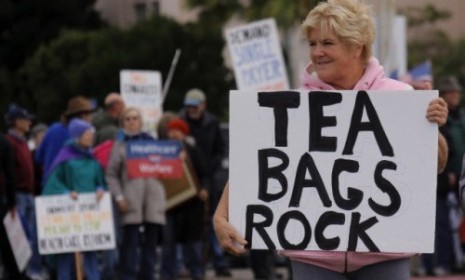Are Tea Partiers the new hippies?
Some say the Tea Party's raucous street protests and anti-government gripes evoke the '60s flower children

A free daily email with the biggest news stories of the day – and the best features from TheWeek.com
You are now subscribed
Your newsletter sign-up was successful
Superficially, 1960s-era hippies have little in common with Tea Partiers. The former group practiced free love, used drugs and called for an end to war. The latter tend to be passionately conservative, pushing for lowering taxes and expanded gun rights. But the similarities, says David Brooks in The New York Times, are "more striking than the differences": Both the "New Left" hippies and the Tea Partier "want to take on The Man, return power to the people, upend the elites and lead a revolution." Is Brooks right — are the disparate movements long-lost twins?
The analogy works — up to a point: The New Left and Tea Partiers both "see a bloodsucking state up on top of society," says Gabriel Winant in Salon. But Tea Partiers also despise the lower classes as "parasites...looking for redistribution." This "multi-directional loathing" makes the Tea Party more akin to "the Ku Klux Klan of the 1920s," which feared both the rich and the poor.
"Who died and made David Brooks king?"
The Week
Escape your echo chamber. Get the facts behind the news, plus analysis from multiple perspectives.

Sign up for The Week's Free Newsletters
From our morning news briefing to a weekly Good News Newsletter, get the best of The Week delivered directly to your inbox.
From our morning news briefing to a weekly Good News Newsletter, get the best of The Week delivered directly to your inbox.
Unlike hippies, Tea Partiers aren't anti-American: Brooks "gets it backwards," says Jonah Goldberg at the National Review. The differences overshadow the similarities. While the New Left wanted to remake America based on "utopian schemes," the Tea Party movement focuses on the Constitution. Fundamentally, "Tea Partiers...love America. The hardcore New Lefters, simply, did not."
So everyone who protests anything is of one breed? Brooks is blinded by his hatred for all antiestablishmentarians, says Allison Kilkenny in True/Slant. In Brooks' eyes, hippies are all "stoned" and "probably naked and covered in mud" — whereas the Tea Parties are "poor redneck[s] who...buy tube socks in bulk at Walmart." To summarize his bias: "If you're protesting, you're a...lunatic."
"Shorter David Brooks: 'You're all paranoid idiots'"
A free daily email with the biggest news stories of the day – and the best features from TheWeek.com
.............................................
SEE MORE OPINION BRIEFS ON THIS TOPIC:
• Tea Party vs. Ron Paul
-
 Political cartoons for February 12
Political cartoons for February 12Cartoons Thursday's political cartoons include a Pam Bondi performance, Ghislaine Maxwell on tour, and ICE detention facilities
-
 Arcadia: Tom Stoppard’s ‘masterpiece’ makes a ‘triumphant’ return
Arcadia: Tom Stoppard’s ‘masterpiece’ makes a ‘triumphant’ returnThe Week Recommends Carrie Cracknell’s revival at the Old Vic ‘grips like a thriller’
-
 My Father’s Shadow: a ‘magically nimble’ film
My Father’s Shadow: a ‘magically nimble’ filmThe Week Recommends Akinola Davies Jr’s touching and ‘tender’ tale of two brothers in 1990s Nigeria